Unit 1 Where did you go on vacation知识过关表格式清单(含答案)
文档属性
| 名称 | Unit 1 Where did you go on vacation知识过关表格式清单(含答案) | 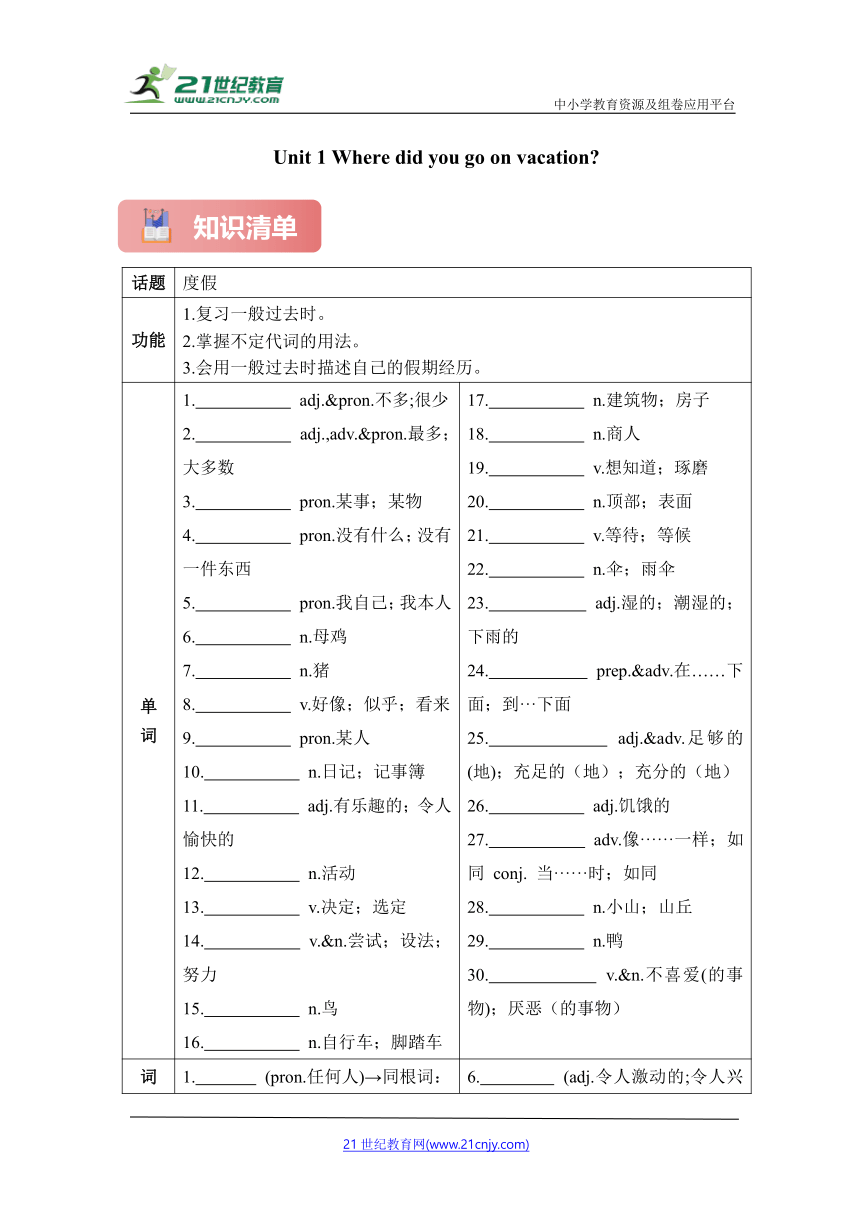 | |
| 格式 | docx | ||
| 文件大小 | 208.0KB | ||
| 资源类型 | 试卷 | ||
| 版本资源 | 人教新目标(Go for it)版 | ||
| 科目 | 英语 | ||
| 更新时间 | 2024-08-05 09:41:05 | ||
图片预览

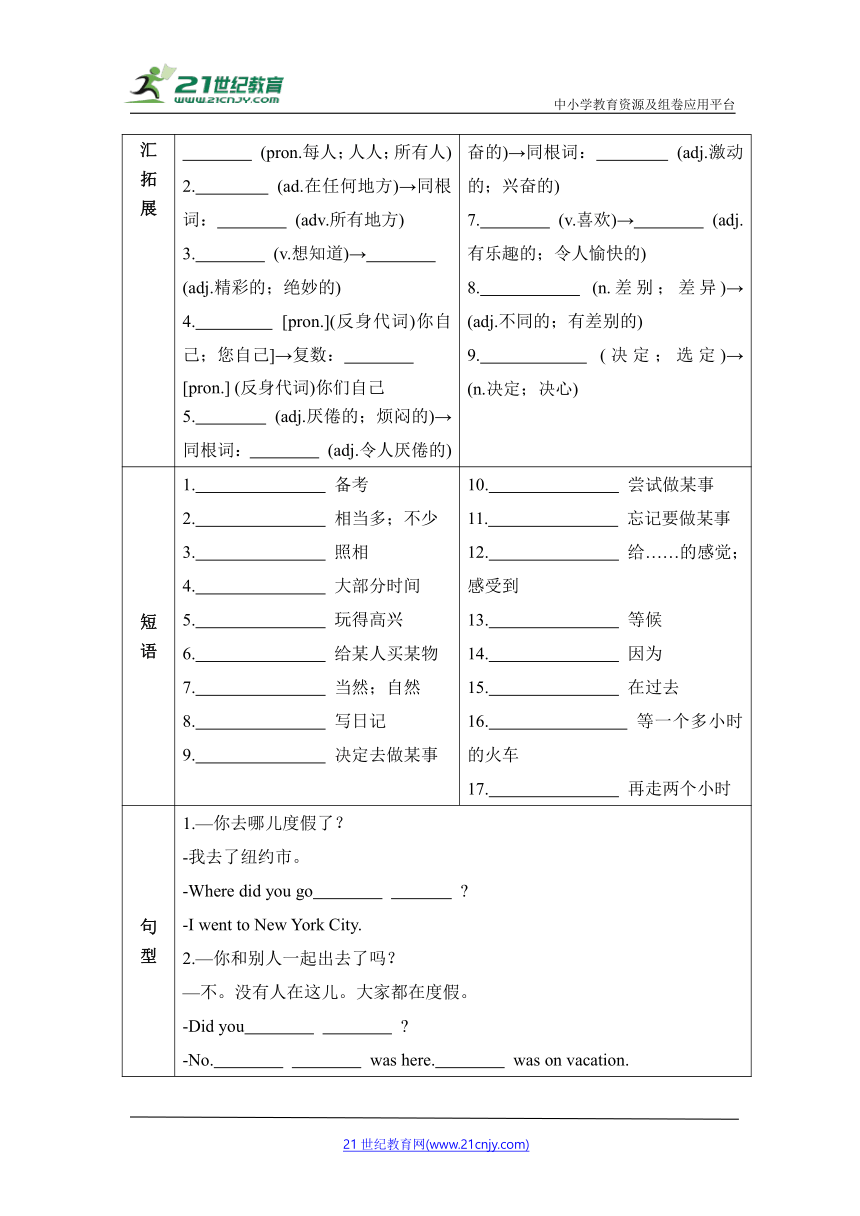
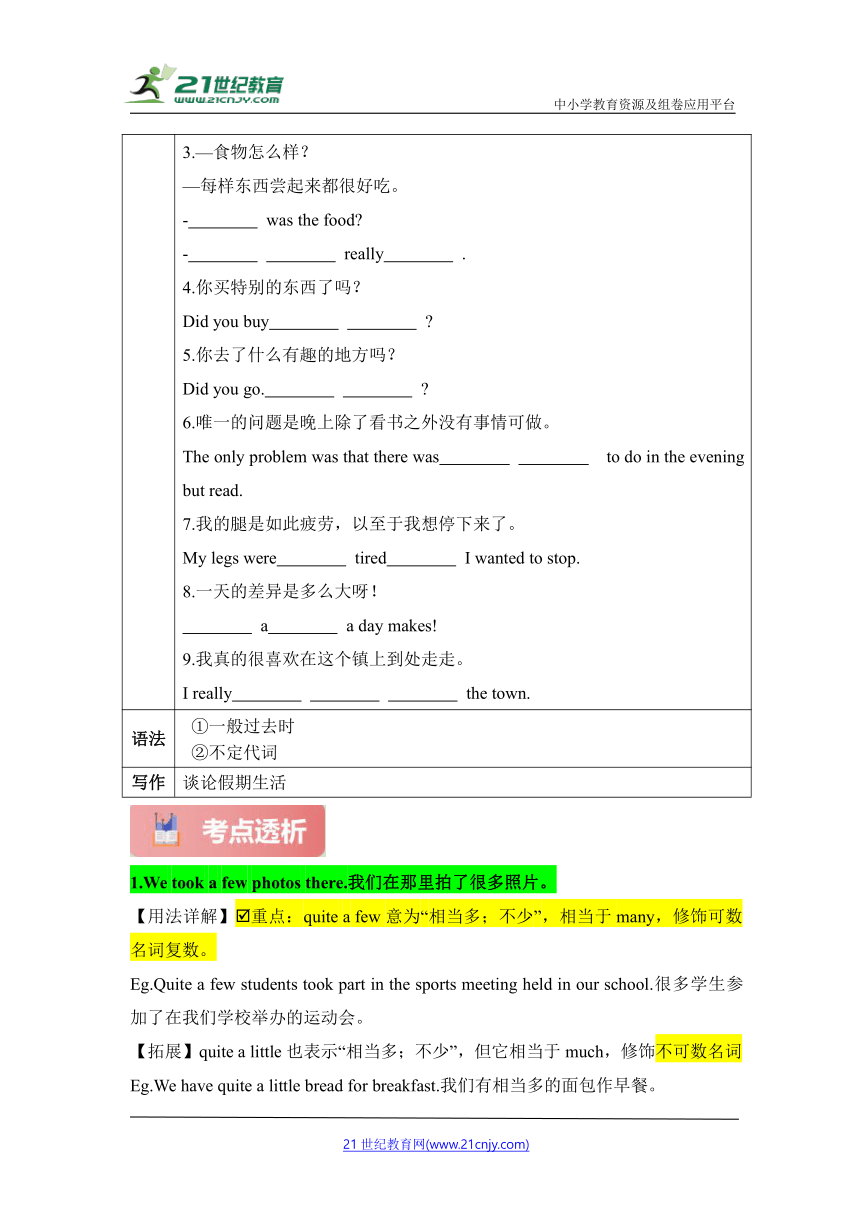
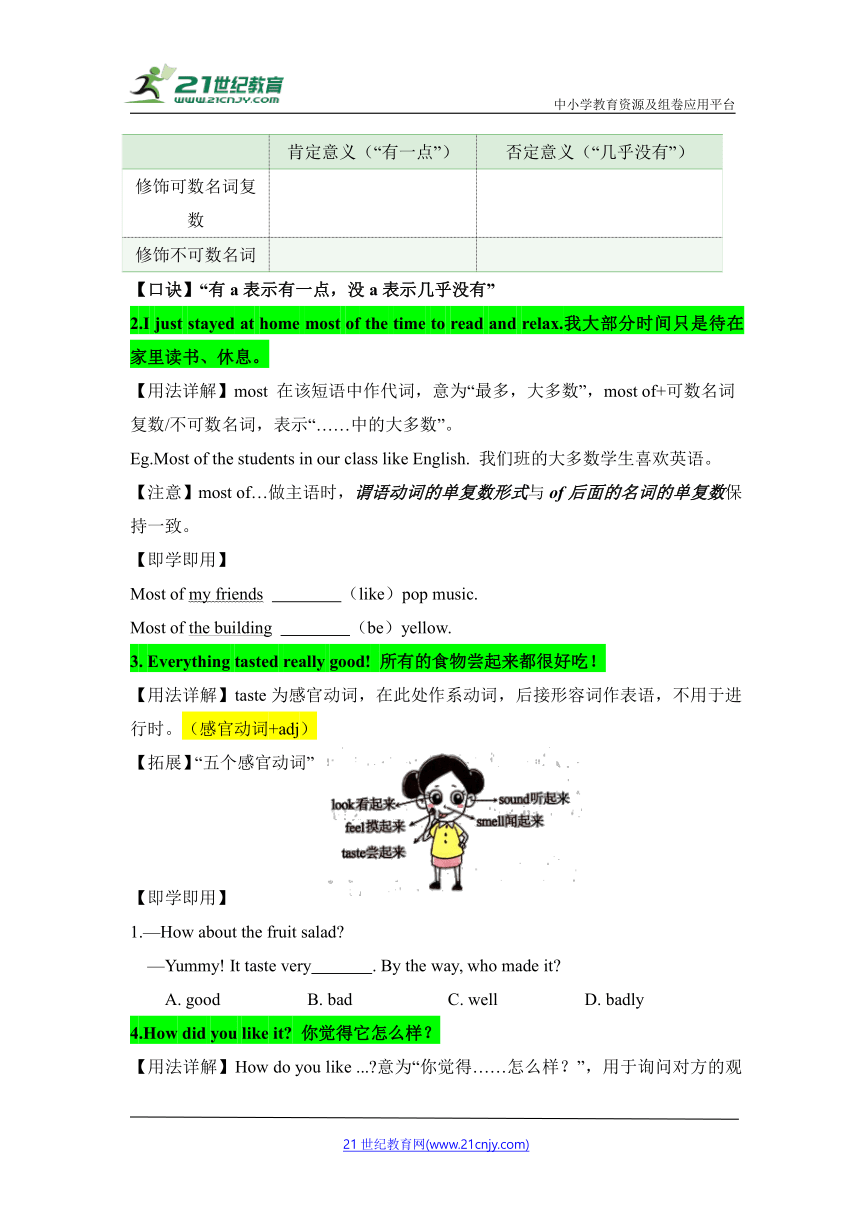
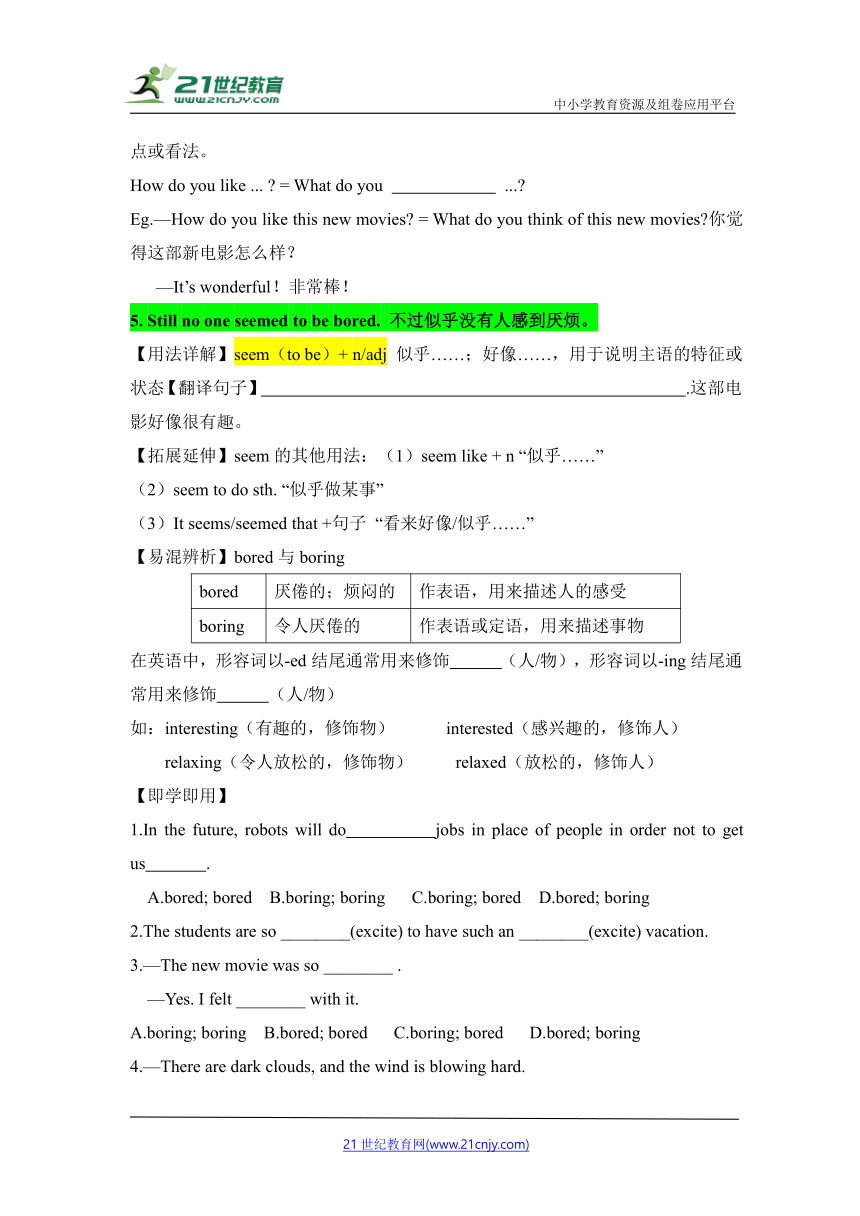
文档简介
中小学教育资源及组卷应用平台
Unit 1 Where did you go on vacation
话题 度假
功能 1.复习一般过去时。 2.掌握不定代词的用法。 3.会用一般过去时描述自己的假期经历。
单 词 1. adj.&pron.不多;很少 2. adj.,adv.&pron.最多;大多数 3. pron.某事;某物 4. pron.没有什么;没有一件东西 5. pron.我自己;我本人 6. n.母鸡 7. n.猪 8. v.好像;似乎;看来 9. pron.某人 10. n.日记;记事簿 11. adj.有乐趣的;令人愉快的 12. n.活动 13. v.决定;选定 14. v.&n.尝试;设法;努力 15. n.鸟 16. n.自行车;脚踏车 17. n.建筑物;房子 18. n.商人 19. v.想知道;琢磨 20. n.顶部;表面 21. v.等待;等候 22. n.伞;雨伞 23. adj.湿的;潮湿的;下雨的 24. prep.&adv.在……下面;到···下面 25. adj.&adv.足够的(地);充足的(地);充分的(地) 26. adj.饥饿的 27. adv.像······一样;如同 conj. 当······时;如同 28. n.小山;山丘 29. n.鸭 30. v.&n.不喜爱(的事物);厌恶(的事物)
词 汇 拓 展 1. (pron.任何人)→同根词: (pron.每人;人人;所有人) 2. (ad.在任何地方)→同根词: (adv.所有地方) 3. (v.想知道)→ (adj.精彩的;绝妙的) 4. [pron.](反身代词)你自己;您自己]→复数: [pron.] (反身代词)你们自己 5. (adj.厌倦的;烦闷的)→同根词: (adj.令人厌倦的) 6. (adj.令人激动的;令人兴奋的)→同根词: (adj.激动的;兴奋的) 7. (v.喜欢)→ (adj.有乐趣的;令人愉快的) 8. (n.差别;差异)→ (adj.不同的;有差别的) 9. (决定;选定)→ (n.决定;决心)
短 语 1. 备考 2. 相当多;不少 3. 照相 4. 大部分时间 5. 玩得高兴 6. 给某人买某物 7. 当然;自然 8. 写日记 9. 决定去做某事 10. 尝试做某事 11. 忘记要做某事 12. 给……的感觉;感受到 13. 等候 14. 因为 15. 在过去 16. 等一个多小时的火车 17. 再走两个小时
句 型 1.—你去哪儿度假了? -我去了纽约市。 -Where did you go -I went to New York City. 2.—你和别人一起出去了吗? —不。没有人在这儿。大家都在度假。 -Did you -No. was here. was on vacation. 3.—食物怎么样? —每样东西尝起来都很好吃。 - was the food - really . 4.你买特别的东西了吗? Did you buy 5.你去了什么有趣的地方吗? Did you go. 6.唯一的问题是晚上除了看书之外没有事情可做。 The only problem was that there was to do in the evening but read. 7.我的腿是如此疲劳,以至于我想停下来了。 My legs were tired I wanted to stop. 8.一天的差异是多么大呀! a a day makes! 9.我真的很喜欢在这个镇上到处走走。 I really the town.
语法 ①一般过去时 ②不定代词
写作 谈论假期生活
1.We took a few photos there.我们在那里拍了很多照片。
【用法详解】重点:quite a few意为“相当多;不少”,相当于many,修饰可数名词复数。
Eg.Quite a few students took part in the sports meeting held in our school.很多学生参加了在我们学校举办的运动会。
【拓展】quite a little也表示“相当多;不少”,但它相当于much,修饰不可数名词
Eg.We have quite a little bread for breakfast.我们有相当多的面包作早餐。
肯定意义(“有一点”) 否定意义(“几乎没有”)
修饰可数名词复数
修饰不可数名词
【口诀】“有a表示有一点,没a表示几乎没有”
2.I just stayed at home most of the time to read and relax.我大部分时间只是待在家里读书、休息。
【用法详解】most 在该短语中作代词,意为“最多,大多数”,most of+可数名词复数/不可数名词,表示“……中的大多数”。
Eg.Most of the students in our class like English. 我们班的大多数学生喜欢英语。
【注意】most of…做主语时,谓语动词的单复数形式与of后面的名词的单复数保持一致。
【即学即用】
Most of my friends (like)pop music.
Most of the building (be)yellow.
3. Everything tasted really good! 所有的食物尝起来都很好吃!
【用法详解】taste为感官动词,在此处作系动词,后接形容词作表语,不用于进行时。(感官动词+adj)
【拓展】“五个感官动词”:
【即学即用】
1.—How about the fruit salad
—Yummy! It taste very . By the way, who made it
A. good B. bad C. well D. badly
4.How did you like it 你觉得它怎么样?
【用法详解】How do you like ... 意为“你觉得……怎么样?”,用于询问对方的观点或看法。
How do you like ... = What do you ...
Eg.—How do you like this new movies = What do you think of this new movies 你觉得这部新电影怎么样?
—It’s wonderful!非常棒!
5. Still no one seemed to be bored. 不过似乎没有人感到厌烦。
【用法详解】seem(to be)+ n/adj 似乎……;好像……,用于说明主语的特征或状态【翻译句子】 .这部电影好像很有趣。
【拓展延伸】seem的其他用法:(1)seem like + n “似乎……”
(2)seem to do sth. “似乎做某事”
(3)It seems/seemed that +句子 “看来好像/似乎……”
【易混辨析】bored与boring
bored 厌倦的;烦闷的 作表语,用来描述人的感受
boring 令人厌倦的 作表语或定语,用来描述事物
在英语中,形容词以-ed结尾通常用来修饰 (人/物),形容词以-ing结尾通常用来修饰 (人/物)
如:interesting(有趣的,修饰物) interested(感兴趣的,修饰人)
relaxing(令人放松的,修饰物) relaxed(放松的,修饰人)
【即学即用】
1.In the future, robots will do jobs in place of people in order not to get us .
A.bored; bored B.boring; boring C.boring; bored D.bored; boring
2.The students are so ________(excite) to have such an ________(excite) vacation.
3.—The new movie was so ________ .
—Yes. I felt ________ with it.
A.boring; boring B.bored; bored C.boring; bored D.bored; boring
4.—There are dark clouds, and the wind is blowing hard.
—It ________ that a typhoon (台风) is coming.
A.feels B.sounds C.seems D.looks
6. I arrived in Penang in Malaysia this morning with my family. 今天早上我和我的家人抵达马来西亚的槟城。
【用法详解】 arrive为不及物动词,后接名词时要加介词,arrive后接地点副词(here,there,home)时不用介词。
e.g. They arrived home from Beijing yesterday.
e.g. When I arrived at the station, it was seven o’clock.
e.g. I’ll phone you when I arrive in New York.
【拓展延伸】“三个到达”:arrive at/in + 地点 = get to + 地点 = reach + 地点
My uncle arrived at my home yesterday.
=My uncle got to my home yesterday.
=My uncle reached my home yesterday.
【即学即用】
1.It's too crowed on the street, so they don't the hotel(旅馆)on time.
A. reach B. arrive C. get D. arrive in
2.We arrived ________ Shanghai ________ a cold morning.
A.in; at B.in; on C.at; on D.at; in
7.It was sunny and hot, so we decided to go to the beach near our hotel. 这里天气晴朗并且炎热,因此我们决定去旅馆附近的海滩。
【用法详解】重点: 决定(不)做某事,decide的名词形式为 .
【即学即用】
1.They decided ________ a house in the city after discussing the price with each other.
A.buy B.to buy C.buying D.bought
2.The hotel was not very far, so we decided ________ (walk) there.
8. My sister and I tried paragliding. 我和妹妹尝试了滑翔伞运动。
【易混辨析】try to do sth 与 try doing sth
try to do sth 尽力做某事 指努力去做
try doing sth 尝试做某事 含有看看某种方法是否能成功的意思,不一定付出努力
e.g. They are trying to solve this problem.他们正在努力解决这个问题。
e.g. Tom is trying solving this problem in this way. 汤姆正在尝试用这种方法解决这个问题。
【即学即用】
1.The food is very delicious in that restaurant. We could go and it.
A.sell B.help C.produce D.try
2.-I can't work it out in this way. -Why not try (do) it another way
9.I felt like I was a bird. 我感觉自己像一只鸟。
【用法详解】feel like 意为“给……的感觉;感觉像”,此处的like为介词,后常接名词或从句。
重点:feel like 还有“想要”的意思,构成固定结构: 想要做某事
【拓展延伸】 “三个想要”:want sth = would like sth = feel like sth
10.I really enjoyed walking around the town. 我真的很喜欢在这个镇上到处走走。
【用法详解】enjoy作及物动词,意为“喜欢;享受……的乐趣”,后常接名词、代词或动词ing形式。
重点: 喜欢做某事
玩得高兴;过得愉快 = / .
【即学即用】
1.Most of us enjoy __________ to our mothers speak, because our brains greatly prefer the voices of our own mothers.
A.listening B.listen C.to listen D.listened
2.Every morning the old people enjoy in the square, singing and dancing.
A. him B. them C. himself D. themselves
11. We waited over an hour for the train because there were too many people. 因为人太多,我们等了一个多小时的火车。
【用法详解】
【易混辨析】too many, too much与much too
too many “太多”,后跟可数名词复数 I have too many books on the bookshelf.
too much “太多”,后跟不可数名词 There is too much ice on the road.
much too “太……”,后跟形容词或副词 It’s much too cold outside.
【即学即用】My cousin is heavy because he often eats fast food.
A.too much; too many B.too many; too much
C.much too; too much D.too much; much too
12. And because of the bad weather, we couldn’t see anything below.并且因为天气不好,我们看不到下面的任何风景。
【易混辨析】重点:because与because of
because “因为”连词,because+句子,because不能与so同时出现在一个句子中
because of “因为;由于”,介词短语,because+名词/代词/短语
Eg.The boy is unhappy because he has no friends.这个男孩不开心,因为他没有朋友。
I like the boy because of his kind nature.我喜欢这个男孩,因为他天性善良。
【即学即用】
1.I didn’t go to the mountains ________ the bad weather.
A.so B.because of C.because D.but
2.The traffic was very bad the snowstorm.
A.because B.because of C.for D.as
13. My father didn’t bring enough money, so we only had one bowl of rice and some fish. 我的爸爸没有带足够的钱,因此我们只吃了一碗米饭和一些鱼肉。
【用法详解】enough意为“足够的”,既可作形容词也可作副词
重点:
【即学即用】
1.Cathy checked her paper so that she could get good grades this time.
A.careful enough B.enough careful C.enough carefully D.carefully enough
2.It was ________ for us to solve the math problem. Few of us could even understand it.
A.easy enough B.enough easy C.difficult enough D.enough difficult
14.What a difference a day makes! 一天的差异真大呀!
【用法详解】difference可以作可数名词,也可以作不可数名词,形容词形式为 .
make a difference表示“产生影响;起作用”
【拓展延伸】
【即学即用】Can you tell me some (different)between the two pictures
一、复合不定代词
一、语法概述
复合不定代词是由some, any, no, every加上-body, -one, -thing构成的不定代词。
二、常见的复合不定代词
some-类 any-类 no-类 every-类
-body 某人;有人 任何人 没有人 每人;所有人
-one 某人;有人 任何人 没有人 每人;所有人
-thing 某事;某物 任何事物 没有什么 每件事;一切
Eg. Someone is waiting for you.有人在等你。(作主语)
I have nothing to say. 我没什么可说的。(作宾语)
Her son is everything for her. 对她来说,儿子就是一切。(作表语)
三、复合不定代词的考点(重点)
【考点1】复合不定代词作主语
复合不定代词作主语时,谓语动词要用单数形式。(be动词的单数是is,实义动词的单数是第三人称单数形式)
【即学即用】
1.Everyone (want)to have a long holiday.
2.Everyone ______ an English story book.
A.have B.are having C.has D.is have
【考点2】复合不定代词被定语修饰
复合不定代词若被定语(形容词、不定式to do、else等)修饰,定语要后置。
常考点:形容词修饰复合不定代词时,形容词要后置(“复合不定代词+形容词”)
Eg.There is something important in today’s newspaper.今天的报纸上有一些重要的信息。
Do you have anything to say 你有什么要说的吗?
Ask somebody else to help you. 另请个人来帮你吧。
【即学即用】
1.Mrs Brown is nice. Every day she tried to cook for me during my stay in Canada.
A. something different B. different something
C. nothing different D. different everything
2.—Did you buy________ —No, I bought nothing.
A.something special B.anything special C.special something D.special anything
【考点3】some-类和any-类复合不定代词的用法区别
1.some-类复合不定代词常用于 句
Eg.There is something wrong with my bike. 我的自行车出问题了。
2.any-类复合不定代词常用于 句和 句
Eg.Is there anyone at home 家里有人吗?
3.在表示委婉请求并希望得到对方的肯定回答的疑问句中要用some-类复合不定代词
Eg.Would you like something to drink 你想要喝点什么吗?
【即学即用】
1.—Do you need me to do______ to help you with the meeting
—Thanks, but______ is ready.
A.something;something B. anything;nothing
C. anything; everything D.everything; nothing
2.Is there ________in today’s newspaper
A. something interesting B. interesting something
C. anything interesting D. interesting anything
二、反身代词
一、语法概述
反身代词常表示“某人自己”,在人称代词宾格或形容词性物主代词后加-self(单数)/ -selves(复数)构成反身代词。
八个反身代词
第一人称 第二人称 第三人称
单数 我自己 你自己 他自己 她自己 它自己
复数 我们自己 你们自己 他们自己
三、反身代词的用法
1.反身代词多用于动词或介词后作宾语,表示“某人自己”
Eg. He learned to ride a bicycle by himself.他自己学会了骑自行车。
2.反身代词应与它所指代的名词或代词在人称和数上保持一致。
Eg. In 1955, Walt Disney himself opened the first Disney Park.在1955年,沃尔特·迪士尼自己开了第一个迪士尼公园。
3.反身代词常考短语:
by oneself 独自 enjoy oneself玩得开心
look after oneself 照顾自己 help oneself to随便吃,随便用 teach oneself 自学
【即学即用】
Could you help me clean the floor?I can't do it __________ (I).
You must look after __________(you) well while I'm away, Tom.
Your sister is too young, so she can’t go to school by (she).
三、一般过去时
一、语法概述
一般过去时表示过去某个时间发生的动作或存在的状态;也表示过去经常或反复发生的动作。
常与yesterday, last night/week/month/year, just now, ...ago等表示过去的时间状语连用。
一般过去时的句式结构
句子类型 含be动词 含行为动词
肯定句 主语+was/were+其他 主语+动词过去式+其他
否定句 主语+was/were+not+其他 主语+didn’t+动词原形+其他
一般疑问句及其回答 Was/Were+主语+其他? 肯定回答:Yes, 主语+was/were. 否定回答:No, 主语+wasn’t/weren’t. Did+主语+动词原形+其他? 肯定回答:Yes, 主语+did. 否定回答:No, 主语+didn’t.
【即学即用】句式转换:
1.I was in Xiamen last month.(改为否定句) .
2.I went to Shanghai last month.(改为否定句) .
3.She was a student four years ago.(改为一般疑问句并作否定回答)
否定回答: .
4.He started to play basketball when he was six years old.(改为一般疑问句并作肯定回答)
肯定回答: .
三、动词变过去式的规则
(一)规则变化
类别 构成方法 例词
一般情况 加-ed play—played
以e结尾的动词 加-d like—liked
以“辅音字母+y”结尾的动词 变y为i,再加-ed study—studied
以重读闭音节结尾,且末尾只有一个辅音字母的动词(辅+元+辅) 双写末尾辅音字母再加-ed stop—stopped
类别 例词
过去式和原形一样 cut→cut read→read/red/ put→put
中间元音变化 i-a swim→swam begin→began sit→sat
i-o ride→rode drive→drove write→wrote
o/a-e draw→drew throw→threw grow→grew
过去式以ought和aught结尾 bring→brought teach→taught catch→caught
结尾的d变为t build→built spend→spent send→sent
含有双写字母的词,将双写改为单写,在词尾加t feel→felt keep→kept smell→smelt
不规则变化:不规则动词的过去式变化需要特殊记忆。
参考答案
知识清单
一、1. few 2. most 3.something4. nothing 5. myself 6. hen 7.pig 8.seem 9. someone 10.diary 14. try 15. bird 16.bicycle11. enjoyable 12. activity 13.decide 17. building 18. trader 19.wonder 20. top 21. wait 22.umbrella 23.wet 24. below 25. enough 26.hungry 27. as 28. hill 29. duck 30.dislike
二、1. anyone; everyone 2. anywhere; everywhere 3. wonder; wonderful
4. yourself; yourselves 5.bored; boring 6. exciting; excited 7.enjoy; enjoyable 8. difference; different 9. decide; decision
三、1. study for tests 2. quite a few 3. take photos/take a photo 4. most of
the time 5. have a good time 6. buy sth. for sb. /buy sb. sth. 7. of course
8. keep a diary 9. decide to do sth. 10. try doing sth. 11. forget to do sth.
12. feel like 13. wait for 14. because of 15. in the past 16. wait over an hour for the train 17. walk for another two hours
四、1. on vacation 2. go out with anyone; No one; Everyone 3. How; Everything tasted; good 4. anything special 5. anywhere interesting 6. nothing much 7.so;that 8.What;difference 9. enjoyed walking around
21世纪教育网(www.21cnjy.com)
Unit 1 Where did you go on vacation
话题 度假
功能 1.复习一般过去时。 2.掌握不定代词的用法。 3.会用一般过去时描述自己的假期经历。
单 词 1. adj.&pron.不多;很少 2. adj.,adv.&pron.最多;大多数 3. pron.某事;某物 4. pron.没有什么;没有一件东西 5. pron.我自己;我本人 6. n.母鸡 7. n.猪 8. v.好像;似乎;看来 9. pron.某人 10. n.日记;记事簿 11. adj.有乐趣的;令人愉快的 12. n.活动 13. v.决定;选定 14. v.&n.尝试;设法;努力 15. n.鸟 16. n.自行车;脚踏车 17. n.建筑物;房子 18. n.商人 19. v.想知道;琢磨 20. n.顶部;表面 21. v.等待;等候 22. n.伞;雨伞 23. adj.湿的;潮湿的;下雨的 24. prep.&adv.在……下面;到···下面 25. adj.&adv.足够的(地);充足的(地);充分的(地) 26. adj.饥饿的 27. adv.像······一样;如同 conj. 当······时;如同 28. n.小山;山丘 29. n.鸭 30. v.&n.不喜爱(的事物);厌恶(的事物)
词 汇 拓 展 1. (pron.任何人)→同根词: (pron.每人;人人;所有人) 2. (ad.在任何地方)→同根词: (adv.所有地方) 3. (v.想知道)→ (adj.精彩的;绝妙的) 4. [pron.](反身代词)你自己;您自己]→复数: [pron.] (反身代词)你们自己 5. (adj.厌倦的;烦闷的)→同根词: (adj.令人厌倦的) 6. (adj.令人激动的;令人兴奋的)→同根词: (adj.激动的;兴奋的) 7. (v.喜欢)→ (adj.有乐趣的;令人愉快的) 8. (n.差别;差异)→ (adj.不同的;有差别的) 9. (决定;选定)→ (n.决定;决心)
短 语 1. 备考 2. 相当多;不少 3. 照相 4. 大部分时间 5. 玩得高兴 6. 给某人买某物 7. 当然;自然 8. 写日记 9. 决定去做某事 10. 尝试做某事 11. 忘记要做某事 12. 给……的感觉;感受到 13. 等候 14. 因为 15. 在过去 16. 等一个多小时的火车 17. 再走两个小时
句 型 1.—你去哪儿度假了? -我去了纽约市。 -Where did you go -I went to New York City. 2.—你和别人一起出去了吗? —不。没有人在这儿。大家都在度假。 -Did you -No. was here. was on vacation. 3.—食物怎么样? —每样东西尝起来都很好吃。 - was the food - really . 4.你买特别的东西了吗? Did you buy 5.你去了什么有趣的地方吗? Did you go. 6.唯一的问题是晚上除了看书之外没有事情可做。 The only problem was that there was to do in the evening but read. 7.我的腿是如此疲劳,以至于我想停下来了。 My legs were tired I wanted to stop. 8.一天的差异是多么大呀! a a day makes! 9.我真的很喜欢在这个镇上到处走走。 I really the town.
语法 ①一般过去时 ②不定代词
写作 谈论假期生活
1.We took a few photos there.我们在那里拍了很多照片。
【用法详解】重点:quite a few意为“相当多;不少”,相当于many,修饰可数名词复数。
Eg.Quite a few students took part in the sports meeting held in our school.很多学生参加了在我们学校举办的运动会。
【拓展】quite a little也表示“相当多;不少”,但它相当于much,修饰不可数名词
Eg.We have quite a little bread for breakfast.我们有相当多的面包作早餐。
肯定意义(“有一点”) 否定意义(“几乎没有”)
修饰可数名词复数
修饰不可数名词
【口诀】“有a表示有一点,没a表示几乎没有”
2.I just stayed at home most of the time to read and relax.我大部分时间只是待在家里读书、休息。
【用法详解】most 在该短语中作代词,意为“最多,大多数”,most of+可数名词复数/不可数名词,表示“……中的大多数”。
Eg.Most of the students in our class like English. 我们班的大多数学生喜欢英语。
【注意】most of…做主语时,谓语动词的单复数形式与of后面的名词的单复数保持一致。
【即学即用】
Most of my friends (like)pop music.
Most of the building (be)yellow.
3. Everything tasted really good! 所有的食物尝起来都很好吃!
【用法详解】taste为感官动词,在此处作系动词,后接形容词作表语,不用于进行时。(感官动词+adj)
【拓展】“五个感官动词”:
【即学即用】
1.—How about the fruit salad
—Yummy! It taste very . By the way, who made it
A. good B. bad C. well D. badly
4.How did you like it 你觉得它怎么样?
【用法详解】How do you like ... 意为“你觉得……怎么样?”,用于询问对方的观点或看法。
How do you like ... = What do you ...
Eg.—How do you like this new movies = What do you think of this new movies 你觉得这部新电影怎么样?
—It’s wonderful!非常棒!
5. Still no one seemed to be bored. 不过似乎没有人感到厌烦。
【用法详解】seem(to be)+ n/adj 似乎……;好像……,用于说明主语的特征或状态【翻译句子】 .这部电影好像很有趣。
【拓展延伸】seem的其他用法:(1)seem like + n “似乎……”
(2)seem to do sth. “似乎做某事”
(3)It seems/seemed that +句子 “看来好像/似乎……”
【易混辨析】bored与boring
bored 厌倦的;烦闷的 作表语,用来描述人的感受
boring 令人厌倦的 作表语或定语,用来描述事物
在英语中,形容词以-ed结尾通常用来修饰 (人/物),形容词以-ing结尾通常用来修饰 (人/物)
如:interesting(有趣的,修饰物) interested(感兴趣的,修饰人)
relaxing(令人放松的,修饰物) relaxed(放松的,修饰人)
【即学即用】
1.In the future, robots will do jobs in place of people in order not to get us .
A.bored; bored B.boring; boring C.boring; bored D.bored; boring
2.The students are so ________(excite) to have such an ________(excite) vacation.
3.—The new movie was so ________ .
—Yes. I felt ________ with it.
A.boring; boring B.bored; bored C.boring; bored D.bored; boring
4.—There are dark clouds, and the wind is blowing hard.
—It ________ that a typhoon (台风) is coming.
A.feels B.sounds C.seems D.looks
6. I arrived in Penang in Malaysia this morning with my family. 今天早上我和我的家人抵达马来西亚的槟城。
【用法详解】 arrive为不及物动词,后接名词时要加介词,arrive后接地点副词(here,there,home)时不用介词。
e.g. They arrived home from Beijing yesterday.
e.g. When I arrived at the station, it was seven o’clock.
e.g. I’ll phone you when I arrive in New York.
【拓展延伸】“三个到达”:arrive at/in + 地点 = get to + 地点 = reach + 地点
My uncle arrived at my home yesterday.
=My uncle got to my home yesterday.
=My uncle reached my home yesterday.
【即学即用】
1.It's too crowed on the street, so they don't the hotel(旅馆)on time.
A. reach B. arrive C. get D. arrive in
2.We arrived ________ Shanghai ________ a cold morning.
A.in; at B.in; on C.at; on D.at; in
7.It was sunny and hot, so we decided to go to the beach near our hotel. 这里天气晴朗并且炎热,因此我们决定去旅馆附近的海滩。
【用法详解】重点: 决定(不)做某事,decide的名词形式为 .
【即学即用】
1.They decided ________ a house in the city after discussing the price with each other.
A.buy B.to buy C.buying D.bought
2.The hotel was not very far, so we decided ________ (walk) there.
8. My sister and I tried paragliding. 我和妹妹尝试了滑翔伞运动。
【易混辨析】try to do sth 与 try doing sth
try to do sth 尽力做某事 指努力去做
try doing sth 尝试做某事 含有看看某种方法是否能成功的意思,不一定付出努力
e.g. They are trying to solve this problem.他们正在努力解决这个问题。
e.g. Tom is trying solving this problem in this way. 汤姆正在尝试用这种方法解决这个问题。
【即学即用】
1.The food is very delicious in that restaurant. We could go and it.
A.sell B.help C.produce D.try
2.-I can't work it out in this way. -Why not try (do) it another way
9.I felt like I was a bird. 我感觉自己像一只鸟。
【用法详解】feel like 意为“给……的感觉;感觉像”,此处的like为介词,后常接名词或从句。
重点:feel like 还有“想要”的意思,构成固定结构: 想要做某事
【拓展延伸】 “三个想要”:want sth = would like sth = feel like sth
10.I really enjoyed walking around the town. 我真的很喜欢在这个镇上到处走走。
【用法详解】enjoy作及物动词,意为“喜欢;享受……的乐趣”,后常接名词、代词或动词ing形式。
重点: 喜欢做某事
玩得高兴;过得愉快 = / .
【即学即用】
1.Most of us enjoy __________ to our mothers speak, because our brains greatly prefer the voices of our own mothers.
A.listening B.listen C.to listen D.listened
2.Every morning the old people enjoy in the square, singing and dancing.
A. him B. them C. himself D. themselves
11. We waited over an hour for the train because there were too many people. 因为人太多,我们等了一个多小时的火车。
【用法详解】
【易混辨析】too many, too much与much too
too many “太多”,后跟可数名词复数 I have too many books on the bookshelf.
too much “太多”,后跟不可数名词 There is too much ice on the road.
much too “太……”,后跟形容词或副词 It’s much too cold outside.
【即学即用】My cousin is heavy because he often eats fast food.
A.too much; too many B.too many; too much
C.much too; too much D.too much; much too
12. And because of the bad weather, we couldn’t see anything below.并且因为天气不好,我们看不到下面的任何风景。
【易混辨析】重点:because与because of
because “因为”连词,because+句子,because不能与so同时出现在一个句子中
because of “因为;由于”,介词短语,because+名词/代词/短语
Eg.The boy is unhappy because he has no friends.这个男孩不开心,因为他没有朋友。
I like the boy because of his kind nature.我喜欢这个男孩,因为他天性善良。
【即学即用】
1.I didn’t go to the mountains ________ the bad weather.
A.so B.because of C.because D.but
2.The traffic was very bad the snowstorm.
A.because B.because of C.for D.as
13. My father didn’t bring enough money, so we only had one bowl of rice and some fish. 我的爸爸没有带足够的钱,因此我们只吃了一碗米饭和一些鱼肉。
【用法详解】enough意为“足够的”,既可作形容词也可作副词
重点:
【即学即用】
1.Cathy checked her paper so that she could get good grades this time.
A.careful enough B.enough careful C.enough carefully D.carefully enough
2.It was ________ for us to solve the math problem. Few of us could even understand it.
A.easy enough B.enough easy C.difficult enough D.enough difficult
14.What a difference a day makes! 一天的差异真大呀!
【用法详解】difference可以作可数名词,也可以作不可数名词,形容词形式为 .
make a difference表示“产生影响;起作用”
【拓展延伸】
【即学即用】Can you tell me some (different)between the two pictures
一、复合不定代词
一、语法概述
复合不定代词是由some, any, no, every加上-body, -one, -thing构成的不定代词。
二、常见的复合不定代词
some-类 any-类 no-类 every-类
-body 某人;有人 任何人 没有人 每人;所有人
-one 某人;有人 任何人 没有人 每人;所有人
-thing 某事;某物 任何事物 没有什么 每件事;一切
Eg. Someone is waiting for you.有人在等你。(作主语)
I have nothing to say. 我没什么可说的。(作宾语)
Her son is everything for her. 对她来说,儿子就是一切。(作表语)
三、复合不定代词的考点(重点)
【考点1】复合不定代词作主语
复合不定代词作主语时,谓语动词要用单数形式。(be动词的单数是is,实义动词的单数是第三人称单数形式)
【即学即用】
1.Everyone (want)to have a long holiday.
2.Everyone ______ an English story book.
A.have B.are having C.has D.is have
【考点2】复合不定代词被定语修饰
复合不定代词若被定语(形容词、不定式to do、else等)修饰,定语要后置。
常考点:形容词修饰复合不定代词时,形容词要后置(“复合不定代词+形容词”)
Eg.There is something important in today’s newspaper.今天的报纸上有一些重要的信息。
Do you have anything to say 你有什么要说的吗?
Ask somebody else to help you. 另请个人来帮你吧。
【即学即用】
1.Mrs Brown is nice. Every day she tried to cook for me during my stay in Canada.
A. something different B. different something
C. nothing different D. different everything
2.—Did you buy________ —No, I bought nothing.
A.something special B.anything special C.special something D.special anything
【考点3】some-类和any-类复合不定代词的用法区别
1.some-类复合不定代词常用于 句
Eg.There is something wrong with my bike. 我的自行车出问题了。
2.any-类复合不定代词常用于 句和 句
Eg.Is there anyone at home 家里有人吗?
3.在表示委婉请求并希望得到对方的肯定回答的疑问句中要用some-类复合不定代词
Eg.Would you like something to drink 你想要喝点什么吗?
【即学即用】
1.—Do you need me to do______ to help you with the meeting
—Thanks, but______ is ready.
A.something;something B. anything;nothing
C. anything; everything D.everything; nothing
2.Is there ________in today’s newspaper
A. something interesting B. interesting something
C. anything interesting D. interesting anything
二、反身代词
一、语法概述
反身代词常表示“某人自己”,在人称代词宾格或形容词性物主代词后加-self(单数)/ -selves(复数)构成反身代词。
八个反身代词
第一人称 第二人称 第三人称
单数 我自己 你自己 他自己 她自己 它自己
复数 我们自己 你们自己 他们自己
三、反身代词的用法
1.反身代词多用于动词或介词后作宾语,表示“某人自己”
Eg. He learned to ride a bicycle by himself.他自己学会了骑自行车。
2.反身代词应与它所指代的名词或代词在人称和数上保持一致。
Eg. In 1955, Walt Disney himself opened the first Disney Park.在1955年,沃尔特·迪士尼自己开了第一个迪士尼公园。
3.反身代词常考短语:
by oneself 独自 enjoy oneself玩得开心
look after oneself 照顾自己 help oneself to随便吃,随便用 teach oneself 自学
【即学即用】
Could you help me clean the floor?I can't do it __________ (I).
You must look after __________(you) well while I'm away, Tom.
Your sister is too young, so she can’t go to school by (she).
三、一般过去时
一、语法概述
一般过去时表示过去某个时间发生的动作或存在的状态;也表示过去经常或反复发生的动作。
常与yesterday, last night/week/month/year, just now, ...ago等表示过去的时间状语连用。
一般过去时的句式结构
句子类型 含be动词 含行为动词
肯定句 主语+was/were+其他 主语+动词过去式+其他
否定句 主语+was/were+not+其他 主语+didn’t+动词原形+其他
一般疑问句及其回答 Was/Were+主语+其他? 肯定回答:Yes, 主语+was/were. 否定回答:No, 主语+wasn’t/weren’t. Did+主语+动词原形+其他? 肯定回答:Yes, 主语+did. 否定回答:No, 主语+didn’t.
【即学即用】句式转换:
1.I was in Xiamen last month.(改为否定句) .
2.I went to Shanghai last month.(改为否定句) .
3.She was a student four years ago.(改为一般疑问句并作否定回答)
否定回答: .
4.He started to play basketball when he was six years old.(改为一般疑问句并作肯定回答)
肯定回答: .
三、动词变过去式的规则
(一)规则变化
类别 构成方法 例词
一般情况 加-ed play—played
以e结尾的动词 加-d like—liked
以“辅音字母+y”结尾的动词 变y为i,再加-ed study—studied
以重读闭音节结尾,且末尾只有一个辅音字母的动词(辅+元+辅) 双写末尾辅音字母再加-ed stop—stopped
类别 例词
过去式和原形一样 cut→cut read→read/red/ put→put
中间元音变化 i-a swim→swam begin→began sit→sat
i-o ride→rode drive→drove write→wrote
o/a-e draw→drew throw→threw grow→grew
过去式以ought和aught结尾 bring→brought teach→taught catch→caught
结尾的d变为t build→built spend→spent send→sent
含有双写字母的词,将双写改为单写,在词尾加t feel→felt keep→kept smell→smelt
不规则变化:不规则动词的过去式变化需要特殊记忆。
参考答案
知识清单
一、1. few 2. most 3.something4. nothing 5. myself 6. hen 7.pig 8.seem 9. someone 10.diary 14. try 15. bird 16.bicycle11. enjoyable 12. activity 13.decide 17. building 18. trader 19.wonder 20. top 21. wait 22.umbrella 23.wet 24. below 25. enough 26.hungry 27. as 28. hill 29. duck 30.dislike
二、1. anyone; everyone 2. anywhere; everywhere 3. wonder; wonderful
4. yourself; yourselves 5.bored; boring 6. exciting; excited 7.enjoy; enjoyable 8. difference; different 9. decide; decision
三、1. study for tests 2. quite a few 3. take photos/take a photo 4. most of
the time 5. have a good time 6. buy sth. for sb. /buy sb. sth. 7. of course
8. keep a diary 9. decide to do sth. 10. try doing sth. 11. forget to do sth.
12. feel like 13. wait for 14. because of 15. in the past 16. wait over an hour for the train 17. walk for another two hours
四、1. on vacation 2. go out with anyone; No one; Everyone 3. How; Everything tasted; good 4. anything special 5. anywhere interesting 6. nothing much 7.so;that 8.What;difference 9. enjoyed walking around
21世纪教育网(www.21cnjy.com)
同课章节目录
- Unit 1 Where did you go on vacation?
- Section A
- Section B
- Unit 2 How often do you exercise?
- Section A
- Section B
- Unit 3 I'm more outgoing than my sister.
- Section A
- Section B
- Unit 4 What's the best movie theater?
- Section A
- Section B
- Unit 5 Do you want to watch a game show?
- Section A
- Section B
- Unit 6 I'm going to study computer science.
- Section A
- Section B
- Unit 7 Will people have robots?
- Section A
- Section B
- Unit 8 How do you make a banana milk shake?
- Section A
- Section B
- Unit 9 Can you come to my party?
- Section A
- Section B
- Unit 10 If you go to the party, you'll have a grea
- Section A
- Section B
